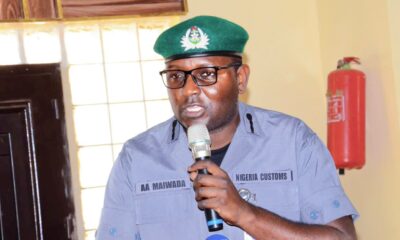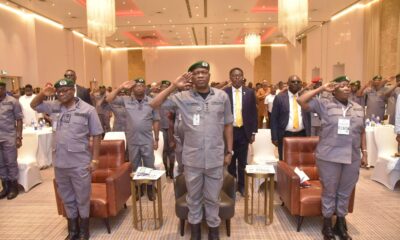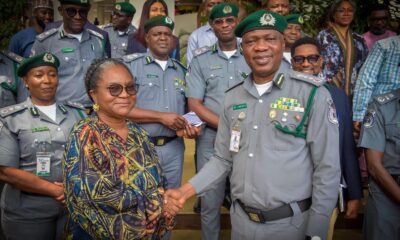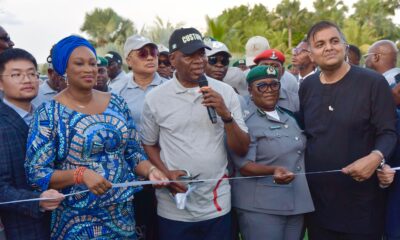Customs Report
‘CGC Adeniyi’s Administration Redefining Cargo Delivery Efficiency’
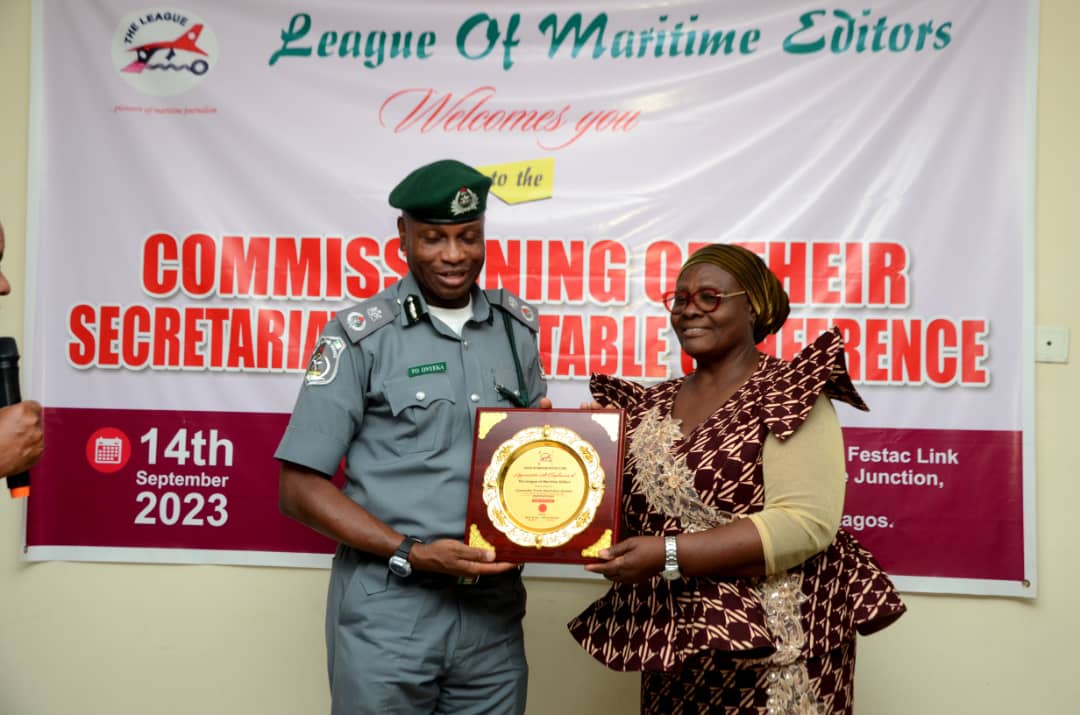
BY EGUONO ODJEGBA
Contrary to belief in some quarters that the Nigeria Customs Service (NCS) is frustrating trade and making importation compliance system difficult owing to its strict application of the extant laws, the Area Controller of Tin Can Island Command, Comptroller Frank Onyeka, has faulted such notion, noting that it is a manifestation of poor assessment and analysis.
Comptroller Onyeka said that the present administration of the NCS in line with President Bola Tinubu’s Renewed Hope Agenda have been in the forefront of recreating the ease of doing business and raising operational efficiencies to support the national economy, over and above any other organ of the federal government.
Onyeka who was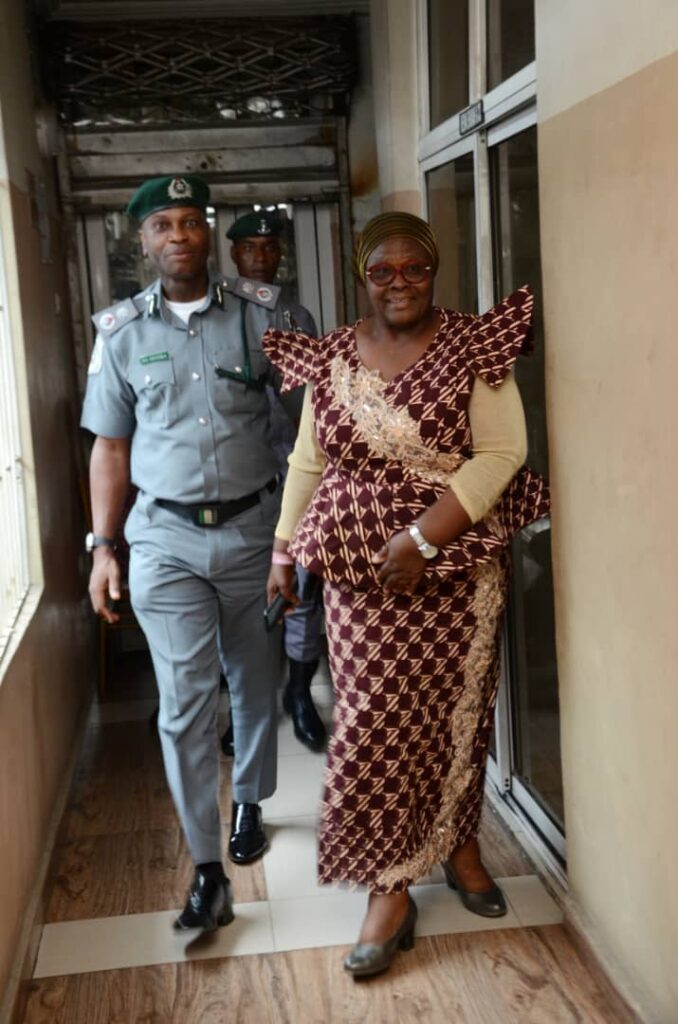 speaking with maritime editors and publishers when he visited the League of Maritime Editors (LOME) last Thursday at the League’s Secretariat in Amuwo-Odofin Industrial Estate, Lagos, explained that since the inception of the present administration of the NCS, there has been conscious and deliberate effort to remove overbearing trade obstacles by way of complying with the political leadership’s will to ameliorate the sufferings of the masses through a systemic, mild adjustments to trade laws designed to lessen the otherwise strict regime of fiscal policy implementation.
speaking with maritime editors and publishers when he visited the League of Maritime Editors (LOME) last Thursday at the League’s Secretariat in Amuwo-Odofin Industrial Estate, Lagos, explained that since the inception of the present administration of the NCS, there has been conscious and deliberate effort to remove overbearing trade obstacles by way of complying with the political leadership’s will to ameliorate the sufferings of the masses through a systemic, mild adjustments to trade laws designed to lessen the otherwise strict regime of fiscal policy implementation.
This is even as he said that currently, the nation’s customs trade is about the most friendly and fairest in the sub region, disposed to trade facilitation with a robust reward system for compliant traders, importers and stakeholders.
According to him, the present customs administration is committed to the aforementioned remodeling of its modus operandi while strengthening the new measures in place through the policy of appropriate and collectable revenue instead of prioritising maximum revenue collection.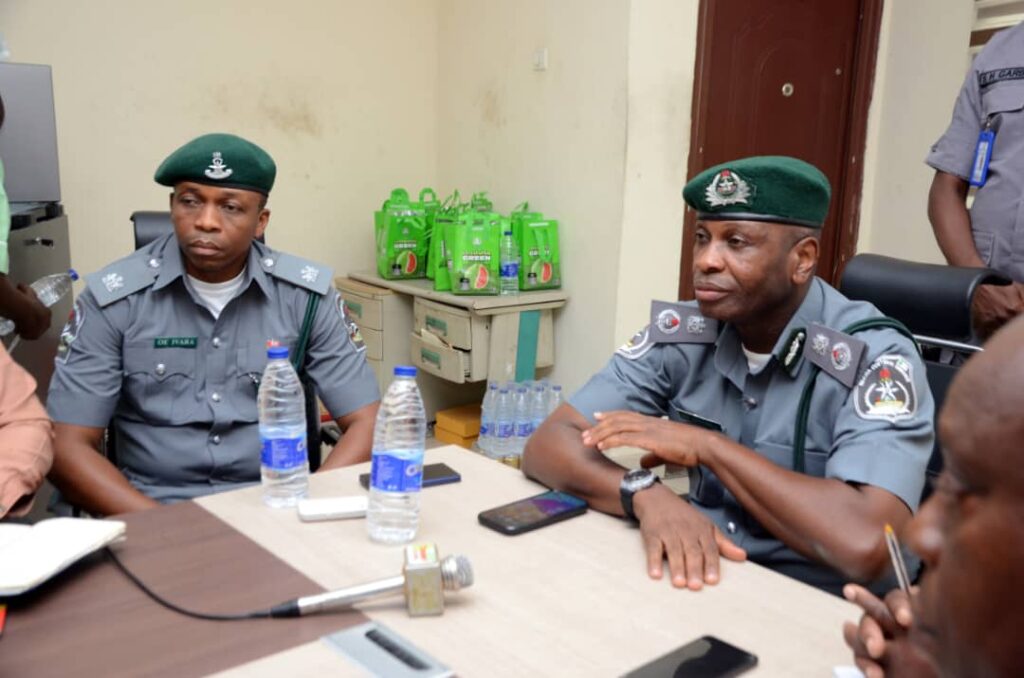
“As a valuation and revenue officer, l know that if we choke a trader, he may not be able to return to the market, because whether we like it or not, trading is all about turnover. So if the goods in question are trade goods and there are no security issues but simple administrative or valuation issues, we calculate the collectible revenue for payment and allow the goods go.
“One of the first issue l attended to was that of multiple alerts, l am happy to say that we have resolved that challenge. There are two types of allowable alert, the alert based on due diagnosis of the goods and that of the Customs Area Controller (CAC) intervention. I do intervention after the due diagnosis, and this two is sufficient to enable the movement of goods from the port to their final destination.”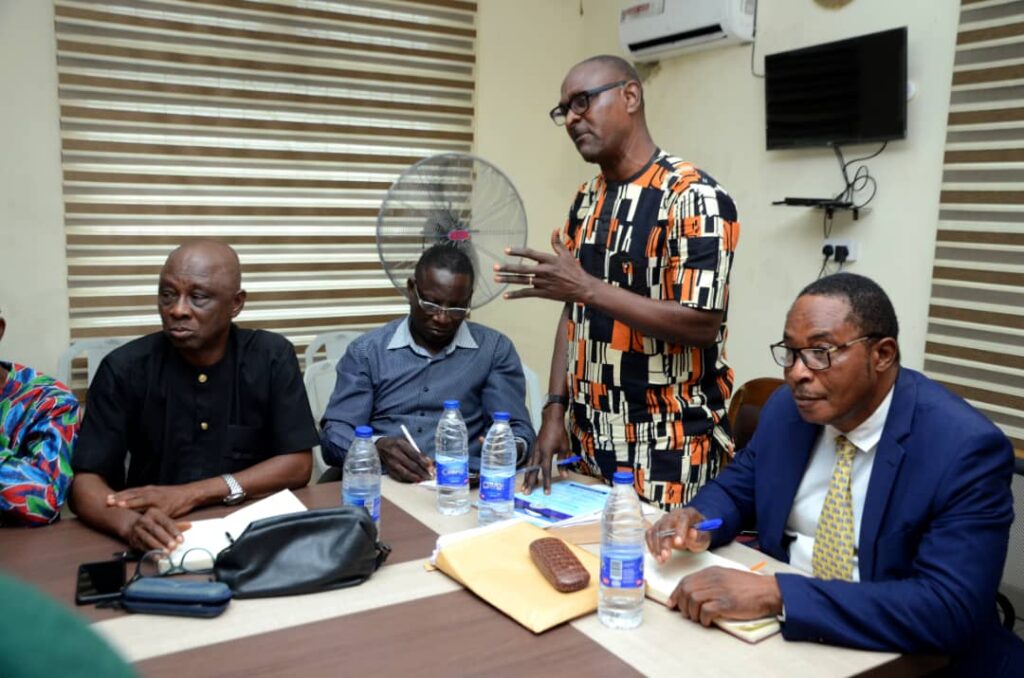
“Like l already said, we are redefining our modus operandi, we are to make things easy for the traders and the masses. And that is why l appreciate my boss and brother, ACG Dera Nnadi, he set the pace with a strong stakeholders engagement were the rules are laid bare. We are not ready to choke Nigerians but we are constrained to carry out physical examination where necessary. It could be 100percent physical examination where we un-stuff the entire container and reload. It is herculean and sometimes we do random inspection of containerized goods.
“Of course if we did not see certain things that were concealed, maybe unfortunately in the spot we didn’t examine, one of the two alerts will expose whatever is hidden”, he enthused.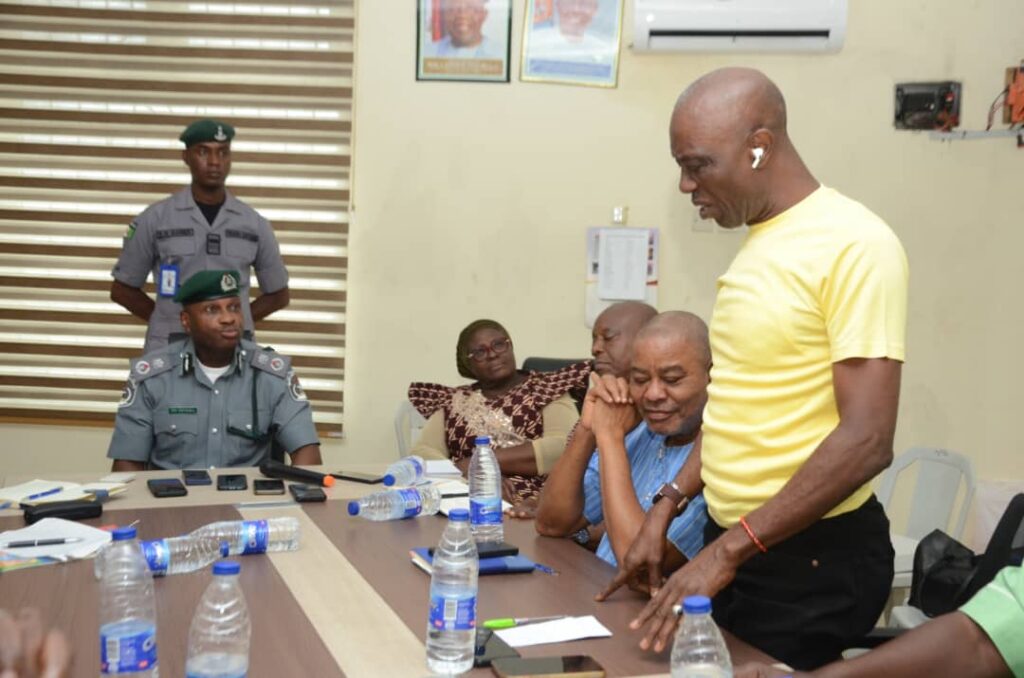
According to him, the Command spends time to create awareness on the need to keep to the rules of the game, assuring that those who are compliant to the trade rules have the benefit of fast track release of their cargo, while generally, “we ensure that trade is not choked.”
To demonstrate the service’s renewed commitment to trade facilitation, Onyeka said that once containers are opened for examination and there are no issues of compliance, clearance is not delayed.
“We do this to promote trade. We have the support of the trading community. We are also working to ensure that the President’s Renewed Hope Agenda’ on trade succeeds. What we preach is that importers keep to the rules and regulations. By this we talk to our partners, importers and freight forwarders to be compliant if they want the best.”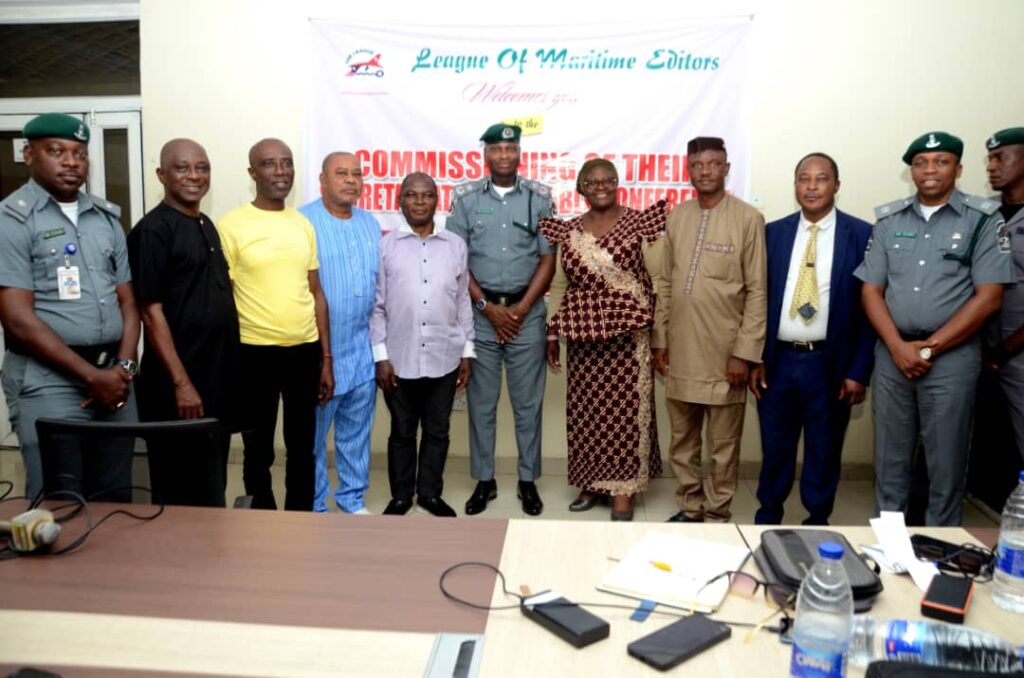
Speaking further, Onyeka said that the CGC Adewale Adeniyi led administration is also seriously discouraging unwarranted delay in cargo movement after exit from the ports, citing example of the stoppage of containersalready cleared from mother ports by either the Customs Police or operatives of the Federal Operation Unit (FOU), except the condition precedent supports such additional checks.

Fielding questions from members of the League, Onyeka said the command has an efficient dispute resolution table to attend to any issues concerning the rules of import and export, and any dispute arising there from; in line with the command’s robust stakeholders’ engagement and collaboration.
While the CAC’s advice has largely solved the problem, the Command robust dispute resolution team also treats disputes with dispatch, adding that the secret of their success so far is continuous engagement with stakeholders.
“But anything pertaining to security violation is a no, no and must pass the rigours of investigation. I will not say because l want to facilitate trade l should neglect national security. We engage consistently and l have made it clear to our stakeholders that while trade facilitation is our focus, the national security supersedes.”
He described the newly developed customs management system, B’ Odogwu as a game changer and the best thing that has happened to the Customs Service, saying it has ended the network issue suffered in the past while processing documents for clearance.
“Before the advent of B’Odogwu , network was very erratic as far as our operations are concerned. Odogwu is a game changer, once you get it right, your consignment can leave in 2hours… nothing like glitches”
On whether he would encourage more bonded terminals to be established to boost the command’s optimal productivity and increased revenue, Onyeka responded to the contrary, noting that a large percentage of leakages in customs operations come from bonded terminals.
“I am not comfortable with some of the bonded terminals because a great number of leakages we have seen come from there. For instance, if three containers are stemmed for bonded terminals, there may not be any assurance that all of them will get there. Besides, even if all get to the terminals, not all of them may be examined.”
To ensure that all containers going to the bonded terminals are examined, he said he makes sure that video of the examination is sent to him by the releasing officers. In addition he disclosed that most documents are now treated at the mother port with the consignments no longer allowed to go to bonded terminals except they are fully utilised.
This is even as he further explained that part of the stern measures in place is to ensure that he does not sign any document he is not sure of its authenticity, insisting that terminal operators will not be allowed to serve as weak links in the command’s operations under his watch.
His words: “We take into cognisance of national security, trade facilitation and so on. Once your consignment is the same with your declaration after examination is made, your goods get released. Our officers are at different places monitoring. We equally carry out strong sensitization on customs clearing agents. The implication is that unscrupulous bonded terminal operators and their customs agents are no longer able to swindle the country or have a field day.”
For the first half year 2025, Onyeka said the Command collected the sum of N747,079,233,259.91. This is even as he explained that the figure indicated a remarkable surplus of N171,719,786,247.68 when compared to the first half of 2024, which stood at N575,359,447,011.23.
The figure according to him represents a growth of approximately 29.85% increase, even as the figure has achieved a 98.03% of the expected collection for the first half of the year 2025.
While thanking the CGC Adewale Adeniyi for his appointment as CAC, he eulogised ACG Dera Nnadi mni, for leaving behind a vibrant operational system he said he had internal struggle about how to fill in the space left behind by his predecessor’s big shoes.
“We came in on December 20 last year. It’s been very challenging and at the same time very rewarding. Dera’s accomplishments gave me some fits…how will I measure up?
“Remember that the CGC posted me as the area controller even with the rank of a deputy comptroller that was a big decision based on trust, failure was not an option. So I started with engagements and that gave me pointers where to direct my attention”, he said with a tinge of accomplishment.



